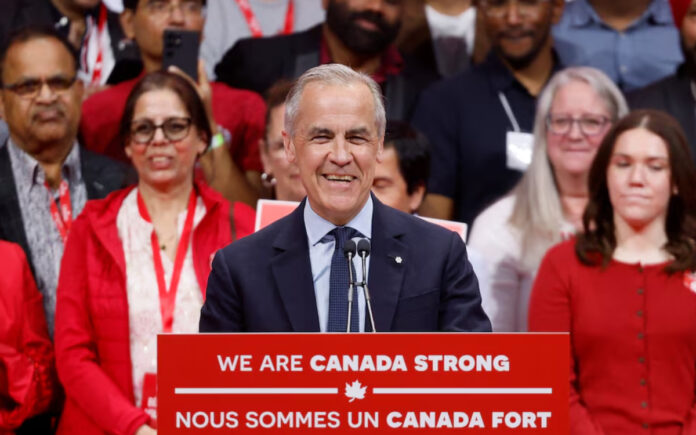Ottawa: Canadian Prime Minister Mark Carney’s Liberals secured a narrow victory in the country’s election on Monday, although they fell short of the majority government Carney had hoped for in order to strengthen his hand in negotiations with U.S. President Donald Trump over tariffs.
Conservative leader Pierre Poilievre conceded defeat to Carney’s Liberals, vowing that his party would hold the minority government to account in Parliament. The Liberals won or were leading in 164 electoral districts (seats), while the Conservatives secured 147, with votes still being counted. To achieve a majority and govern without support from smaller parties, the Liberals would have needed 172 seats in the House of Commons.
Shachi Kurl, president of the Angus Reid Institute polling firm, explained that the Liberal victory was driven by three key factors: “It was the ‘anybody-but-Conservative’ factor, it was the Trump tariff factor, and then it was the Trudeau departure… which enabled a lot of left-of-center voters and traditional Liberal voters to come back to the party.”
Carney had campaigned on a tough stance toward Washington, vowing to confront the U.S. over its import tariffs and to invest billions to reduce Canada’s reliance on the U.S. However, the right-of-center Conservatives, advocating for change after more than nine years of Liberal rule, showed unexpected strength. Minority governments in Canada often do not last beyond two and a half years.
The results marked a remarkable comeback for the Liberals, who were trailing by 20 percentage points in the polls in January before former Prime Minister Justin Trudeau’s resignation and Trump’s threats over tariffs and annexation reignited national unity. Liberal Transport Minister Chrystia Freeland reflected on the victory, saying, “I look back to as recently as December, when everyone was writing the Liberal Party off… Tonight, when it is clear that we are going to form the government, from my perspective, that is an outstanding result.”
Freeland’s resignation from the Liberal cabinet in December, following a clash with Trudeau, played a significant role in his eventual departure.
Trump’s threats triggered a wave of patriotism across Canada, which boosted Carney’s appeal as a political newcomer with extensive experience managing economic issues, particularly as former head of two G7 central banks. Trump’s influence in the campaign resurfaced in the final week when he announced the possibility of a 25% tariff on Canadian-made cars and reiterated his desire to make Canada the 51st U.S. state. Trump’s social media post on election day said, “Good luck to the Great people of Canada. Elect the man who has the strength and wisdom to cut your taxes in half… if Canada becomes the cherished 51st State of the United States of America.”
In contrast, Poilievre’s campaign focused on addressing domestic issues, including the cost of living, rising crime, and the housing crisis. While the Conservatives managed to make gains in the Toronto area, Poilievre was trailing in his own Ottawa-area district as votes were still being counted.
Tensions with the U.S. played a significant role in shifting support toward the Liberals from smaller parties, including the left-leaning New Democratic Party (NDP) and the separatist Bloc Quebecois. NDP leader Jagmeet Singh conceded defeat in his own district and announced plans to step down as party leader.
Despite the Conservative push to secure Toronto, the Liberals’ win in the election makes them the last party to have won four consecutive elections in Canada, a feat they last achieved in 2004.



